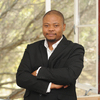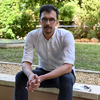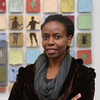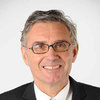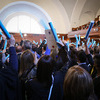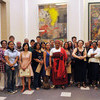"Bold" Mpolokeng believes in the beauty of her dreams
15 April 2016 | Story Yusuf Omar. Photo Je'nine May.
When Kentse Mpolokeng took up an nGAP* lectureship in anatomy at UCT at the beginning of this year, she was fulfilling a career ambition that she had spelled out to an interview panel years ago. But it almost didn't happen.
After matriculating from Ntsu Secondary School in the Free State in 2008, Mpolokeng was not admitted to the University of the Free State Medical School. No matter.
“My dream of a bright future didn't end there,” says Mpolokeng. “I enrolled for the Bachelor of Sciences degree at UFS and have always aimed to become one of the top medical researchers in the country.”
Upon graduating in 2012, Mpolokeng enrolled for an honours degree in anatomy the following year. One of the questions posed to her at the interview was where she saw herself in five years' time.
“I boldly answered: I see myself as an anatomist, building my career in research as an academic and still enrolled for postgraduate studies.”
Indeed, Mpolokeng subsequently enrolled for a master's degree that she plans to complete soon. Her academic career began as an anatomy officer at the University of the Western Cape in 2014. Just over a year later, she was appointed as senior officer in anatomy, and she took up the nGAP lectureship at UCT at the beginning of 2016.
“I am really honoured that my dream really came to unfold like that,” she adds.
Mpolokeng is also part of UCT's Emerging Researchers Programme (ERP), which guides researchers from a foundational phase through to the highest level. ERP assists researchers with searching for sources in the library, finding funding opportunities, time management and balancing work with studies, how to prepare a poster presentation and other things, until researchers are ready to publish, says Mpolokeng.
She is particularly excited about an upcoming writer's retreat, where ERP scholars will have two-and-a-half days to focus on their research and writing “without distraction”. Interacting with peers on the programme is also invaluable, she says, as they “open other dimensions of looking at things and give inspiration”.
“I would consider myself to be at the beginning stage of research and I'm grateful for all the support I've been receiving throughout the programme as it provides me with the skills and tools towards conducting successful research and sustaining it until I publish in the well-recognised journals in my field,” she says.
That research currently involves exploring variances in blood supply to the eye. The thesis is titled “The prevalence of the anatomical variations in the intraorbital part of the ophthalmic artery and its branches in a cadaver population”. But Mpolokeng is not limiting herself to the eye.
“There are lots of variations in the human body,” she says.
Once her master's degree is out of the way, Mpokoleng plans to enrol for a doctorate in the same area.
“I would love to carry this current project to PhD level, where I will be focusing more on the clinical and radiology part, reading X-ray files to gather information,” she says.
Mpolokeng explains what intrigued her about anatomy, and says that she ignored the scepticism of her academic advisors when picking the discipline. She holds dear her late anatomy lecturer, Mr Steyl, “for the support and encouragements in influencing me to take the career path in anatomy; by also believing in me, I could make it far with anatomy”.
“I picked anatomy as my major since I didn't do it in high school, unlike physiology,” she says. “Many people at my level of study were running away from anatomy, so I wanted to develop my knowledge on the subject only to discover that I was to fall more and more in love with it.
“I was discouraged by the academic advisors as to where I thought I was going to work after completing my studies since this is a scarce skill. I was persistent; something would surely come up. And here I am today.”
Mpolokeng lives by this quote from Eleanor Roosevelt: “Believe in yourself. You gain strength, courage and confidence by every experience in which you stop to look fear in the face. You must do that which you think you cannot do. The future belongs to those who believe in the beauty of their dreams.”
To repeat a question that once drew a bold answer: where does Mpolokeng see herself in five years' time?
“I will have obtained my PhD and will be a senior lecturer in anatomy at UCT and will also have published several papers,” is her unapologetically ambitious response.
 This work is licensed under a Creative Commons Attribution-NoDerivatives 4.0 International License.
This work is licensed under a Creative Commons Attribution-NoDerivatives 4.0 International License.
Please view the republishing articles page for more information.
Centre for Higher Education Development
In the news


.jpg)



